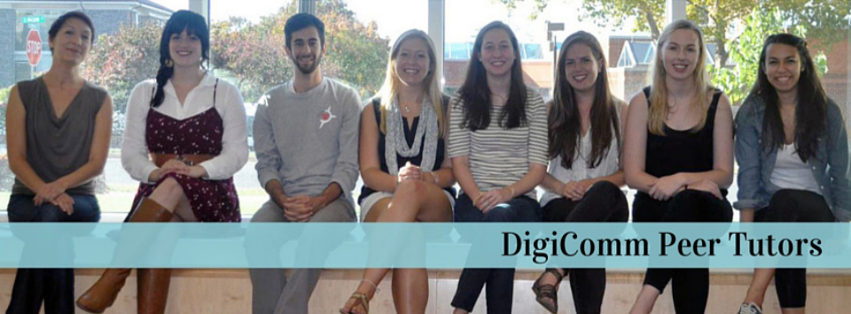Why DigiComm?
Digital Communication Consulting
Why Now?
I was sitting in the School of Media Art's alumni panel for Converged Media two years ago, and the theme I heard again and again from the alumni – who ranged from a Community Manager for Threadless T-shirts to a Rosetta Stone software developer – was the importance of their ability to translate their skills, perspectives, and advice to a non-technical audience that mattered: their boss, their clients, their colleagues. I had been thinking about this issue of "translating" a lot, but not because of my role teaching in SMAD, but my role tutoring in the Writing Center and Communication Center.
JMU Learning Centers have tutors in numerous disciplines: Math, Physics, Chemistry, Writing, Speech Communication, English Language Learning, etc. And one of the commonalities among all of these tutors is their skill at explanation. The role of a tutor involves many different talents, but fundamental to all of them is the ability to take a complex topic that the tutor understands well and explain it to someone who doesn't "speak that language." So we are there to translate a creative writing prompt to the science-minded, translate the professor's comments to the confused freshmen, translate our expertise to those who need it. It's a hard skill to master and its impact is transformational for the students we work with.
After that alumni panel, I started devising how the Learning Centers could offer SMAD, SCOM, and WRTC the invaluable strength of translating their digital communication skills by offering an important service to the students across campus.
Why Portfolios?
Part of this is purely pragmatic: the Learning Centers' mission is to serve students across the university, and I saw professional portfolios as an opportunity to offer an important and relevant service for digital communication. Employers are often looking and expecting to find content online about their applicants. And we have the opportunity to help students control that message and stand out among a sea of applicants.
But more than that, I've seen how creating a professional portfolio can be a transformative experience for students to see themselves as professionals. Portfolios ask us to articulate our values and skill set, identify how we want to put our abilities to use, and demonstrate a range of abilities that expand far beyond a traditional resume or CV. In addition, students are in training in their fields, so by identifying their skills and goals, they can discover what gaps they have in their work samples and find ways to engage in their coursework, internships, GenEds, and campus jobs that can best align for the skills they choose to develop.
Why DigiComm?
Digital portfolios allow students to present a multifaceted professional persona, but with all of these options, it can be difficult to create a portfolio that is coherent and elegant. Also there is a very dangerous notion sometimes found among faculty and administration that college students are "digital natives" and thus can easily create effective digital content. With web builders like wix, weebly, and wordpress, building a portfolio is free and relatively intuitive, but it is far from easy. Crafting the content, work samples, aesthetics, and personal branding for a professional portfolio takes a range of complex skills in addition to the objectivity of our own skills and experience so we can talk about them effectively. This is an intricate and complicated task with high stakes, so our tutors are here to offer support, feedback, and resources for every step of the process.
- Paige Normand, Digital Communication Coordinator
